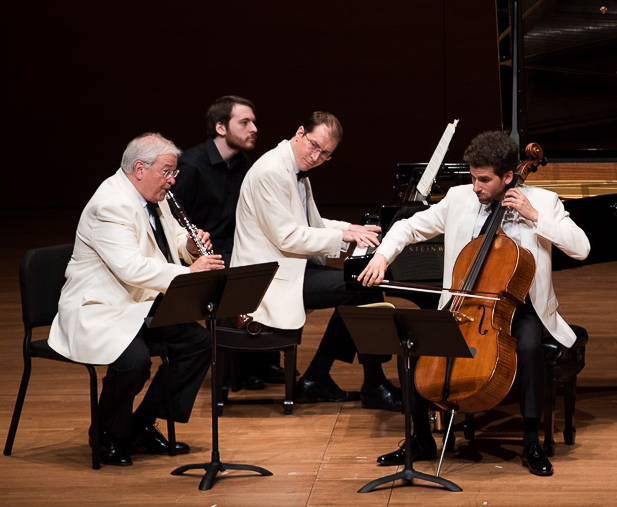Repertoire favorites provide a summer glow at Chamber Music Society

David Shifrin, Gilles Vonsattel and Nicholas Canellakis performed Beethoven’s Clarinet Trio Sunday night for the Chamber Music Society of Lincoln Center. Photo: Cherylynn Tsushima
The hits will just keep coming this month at the Chamber Music Society of Lincoln Center, which launched a three-concert series titled “Summer Evenings” Sunday afternoon at Alice Tully Hall with a program of cheerful works by Beethoven, Weber and Schumann.
In a program note, CMS artistic directors David Finckel and Wu Han promised “rich doses of our core repertoire” for the July series. If this doesn’t sound like a radical departure for the venerable organization, the programs of Beethoven, Romantic composers, and one neoclassical sonata by Prokofiev seem particularly selected to go down as easily as the New York State wines at the post-concert receptions.
Easy listening these pieces may be, but they still put the performers on their mettle, and on Sunday a mix of chamber-music veterans and relative newcomers brought insight, teamwork, and panache to the familiar items on their music stands.
The first movement of Beethoven’s Clarinet Trio received a jaunty, neatly phrased reading, enlivened by rhythm that was right on the mark. Gilles Vonsattel’s piano could have been more assertive—this is Beethoven, after all—but the naturalness and nuance of his phrasing set an example for all.
Clarinetist David Shifrin kept his tone classically focused and clear, with only the occasional squawk at the music’s most exuberant moments. Cellist Nicholas Canellakis was a sensitive, if occasionally underpowered, collaborator.
Shifrin and Canellakis took ripely expressive turns with the Adagio’s main theme, and the movement unfolded with clarity and purpose. The trio’s finale is a bit of a hoot, a set of wildly contrasting variations on a hit opera tune of the day. (Beethoven talked of replacing it with a more substantial movement, but never did.) The genteel CMS artists got the contrast, if not the wildness, in a pleasing performance.
Weber’s Clarinet Quintet was conceived as a showpiece for a famous clarinet virtuoso and is a concerto in all but orchestration. As such, it suffered on Sunday from an unbending chamber-music etiquette, in which all players are equal from the first note to the final bow, and there are no “stars.” Shifrin played with all the requisite lyricism and brilliant technique, but he was seated upstage of his string-playing colleagues—Paul Huang and Ani Kavafian, violins; Matthew Lipman, viola; and cellist Canellakis—and his part sounded stuck in traffic much of the time, instead of leading the pack.
Still, one could tell that Shifrin was in splendid command of his part, from blithe melodies to blindingly fast staccato-slur articulations, while the string group gave spirited support. The clarinetist performed the slow movement’s arioso theme with creamy tone, superb breath control, and delicate inflections that the ensemble mirrored sensitively. At one point, the clarinet’s descent to ghostly super-pianissimo seemed to suspend time.
The so-called Menuetto was actually a madly capricious presto, bursting with rhythmic jokes that depended on precise execution to come off. They got that, and an appreciative chuckle from the audience at the end.
Rhythm—a hushed, staccato gallop in the strings—again drove the finale, with the clarinet above it all, singing, dancing, and tossing off flurries of scales and arpeggios. A little loosening of the reins for the lyrical second theme might have provided more contrast, but the emphasis Sunday was on tight ensemble and momentum, and this performance had plenty of both.
Melodious, high-spirited, learned, and generally irresistible, Schumann’s Piano Quintet is the nearest thing the Chamber Music Society has to a national anthem, and the players tore into it with gusto on Sunday.
Except for the occasional problem with balance—second violinist Huang’s “Wieniawski” Guarneri del Gesù instrument of 1742 is such a legendary powerhouse it had its own sidebar in the program notes—the result was a seasoned performance born of deep affection and familiarity. Veteran first violinist Kavafian, her emphatic playing lifting her out of her chair more than once, led a comparatively youthful cast consisting of Huang, Lipman, Canellakis, and Vonsattel.
The first movement was laid out in bold gestures, with pianist Vonsattel stepping up assertively in the vigorous development. For contrast, one would have welcomed a little more Romantic bloom in the fervent second theme.
Although Schumann marked the second movement “in the style of a march,” the players put a slight stress on the upbeats of its short, breathless phrases, turning the slow march into something more hesitant and furtive, along the lines of Schumann’s dark song “Ich hab’ im Traum geweinet”—a re-interpretation of the composer’s intention, perhaps, but a convincing one.
By contrast, the scherzo was all fleetness and light, its staccato scales bumping giddily into displaced accents. Again, rhythmic precision made it pop, and the further contrast of tender and robust interludes threw this brilliant music into even greater relief.
There’s always a chance such heady stuff will upstage the finale, but Sunday’s performers forestalled that risk by plunging directly into the last movement and giving it a rich reading, ever alert to this composer’s volatile moods and shifting textures. The exuberant fugato of the closing pages, born of Schumann’s belated but diligent study of Bach’s music, ended the evening on a celebratory note.
The Chamber Music Society’s “Summer Evenings” series will continue with works of Brahms, Dvořák, and Mendelssohn 7:30 p.m. Wednesday, and works of Beethoven, Prokofiev and Dvořák 5 p.m. Sunday. chambermusicsociety.org; 212-875-5788.


